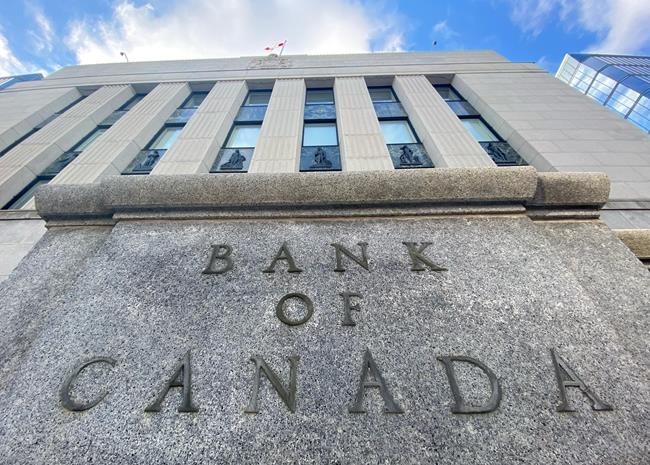OTTAWA — The Bank of Canada kept its key interest rate target on hold Wednesday as it warned the fourth wave of the pandemic and supply bottlenecks could weigh on the economic recovery.
The central bank held its target for the overnight rate at 0.25 per cent, what it calls the effective lower bound.
"The governing council judges that the Canadian economy still has considerable excess capacity, and that the recovery continues to require extraordinary monetary policy support," the bank said in its decision.
The central bank said it continues to expect the economy to strengthen in the second half of the year though the fourth wave, and supply issues may cause problems for the recovery.
It also repeated its commitment to hold its trendsetting rate at near-zero until the economy is ready to handle an increase in rates, which it doesn't expect to happen before the second half of 2022.
The rate decision follows a report last week that the economy contracted at an annualized rate of 1.1 per cent in the second quarter and Statistics Canada said its initial estimate for July pointed to contraction of 0.4 per cent for the first month of the third quarter.
TD Bank senior economist Sri Thanabalasingam said the Bank of Canada will be paying close attention to the upcoming employment and inflation figures.
"A solid gain in jobs in August alongside a tempering of price pressures should leave the bank on track to gradually reduce monetary stimulus in coming quarters," Thanabalasingam wrote in a report.
"However, if the employment report disappoints or inflation picks up further, the bank's governing council will face a more difficult trade off. Boosting monetary stimulus could further aid the recovery, especially given the Delta variant risk, but runs the risk of accelerating price growth."
Thanabalasingam said he'll be watching for any details Bank of Canada governor Tiff Macklem may provide in his speech Thursday about the bank's thinking about the future.
In addition to keeping its key rate on hold, the Bank of Canada also said Wednesday that it would maintain its quantitative easing program by buying bonds at a target pace of $2 billion per week.
By buying Government of Canada bonds, the Bank of Canada helps keep interest rates low and boosts the economy.
Stephen Brown, senior Canada economist at Capital Economics, said there are some emerging downside risks to the economic outlook, but he did not expect those risks to prevent the bank from tapering its asset purchases at its next rate announcement at the end of October.
"Even though the recovery has been delayed by a few months, it is still on the right track and some recent positive developments in the narrower labour market indicators that the bank monitors, such as the employment rate of younger workers, suggests the bank will be happy to reduce the amount of additional stimulus that it is providing," Brown wrote.
The Bank of Canada aims to control inflation by making changes to its policy rate.
The central bank noted that inflation remains above three per cent as expected, boosted by base-year effects, gasoline prices, and pandemic-related supply bottlenecks.
However, it said the factors pushing up inflation are expected to be transitory, but their persistence and magnitude are uncertain and will be monitored closely.
"Wage increases have been moderate to date, and medium-term inflation expectations remain well-anchored," the policy statement says.
The annual pace of inflation rose to 3.7 per cent in July, marking the biggest increase since May 2011, and compared with a year-over-year increase in the consumer price index of 3.1 per cent in June.
The Bank of Canada's next interest rate decision is scheduled for Oct. 27, when it will also update its outlook for the economy and inflation in its fall monetary policy report.
This report by The Canadian Press was first published Sept. 8, 2021.
Craig Wong, The Canadian Press



